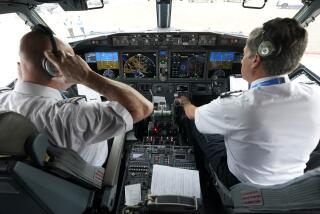Private Airports Get Security Steps
- Share via
WASHINGTON — The Federal Aviation Administration urged the private aviation industry Wednesday to adopt stricter security measures after a student pilot’s suicidal flight into a Tampa, Fla., high-rise last weekend.
In a notice distributed around the country, the agency outlined a series of voluntary steps to limit unsupervised access to aircraft by novice pilots.
The Tampa crash “has raised concerns among the public and federal law enforcement organizations about the security of general aviation [private planes] and how that can be improved,” the FAA noted.
The 11 recommendations made by the agency included using different keys for aircraft ignition and door locks, limiting access to aircraft keys by student pilots until they are ready for solo flight and requiring students to pass a medical examination--including psychiatric screening--before beginning flying lessons.
The agency also recommended closer scrutiny of teenage student-pilots.
Charles J. Bishop, the 15-year-old in the Tampa crash, was performing a preflight check without an instructor present and had the keys to a single-engine Cessna. He took off without authorization, flew over the military base housing the U.S. Central Command, which directs the troops in Afghanistan, and crashed into a downtown office building. Police found a note in his pocket expressing sympathy with Osama bin Laden. Police disclosed Tuesday that Bishop had a prescription for Accutane, an acne drug that has been linked to suicides.
Though the FAA recommendations are voluntary, the Airline Owners and Pilots Assn., which represents private pilots, said it believes most flight schools and general aviation support facilities will adopt at least some of them. The association is concerned that security worries will prompt a crackdown that could restrict the freedoms private pilots have enjoyed.
“We think these are practical suggestions that can be implemented immediately,” said Warren Morningstar, a spokesman for the group. “When you stand back and look at them, what they are really saying is you make sure a student can’t fly until the flight instructor is ready for them to fly.”
Previously, many flight instructors had seen nothing wrong with giving a student the keys to an aircraft. It was considered part of the normal process of building confidence and trust as the student worked up to a solo flight.
The aviation security bill passed by Congress and signed by President Bush in November requires flight schools to provide the Justice Department with information on foreign students. Additional security measures are being considered for private aviation, including tamper-proof pilots’ licenses and security training for operators of small airports.
There are more than 200,000 private aircraft in the United States, with 18,000 small airports and more than 500,000 pilots. With the national publicity surrounding last weekend’s crash, many of those pilots fear their cherished pastime will be curtailed.
“What do you do, put 24-hour security at every gravel-and-grass strip in the country?” asked a commercial airline pilot who did not want to be identified. “What would security be checking for? It would not have stopped this event, because the student pilot was supposed to be there.”
Added the Boeing 737 pilot: “I was once a student in a Cessna too.”
More to Read
Inside the business of entertainment
The Wide Shot brings you news, analysis and insights on everything from streaming wars to production — and what it all means for the future.
You may occasionally receive promotional content from the Los Angeles Times.










